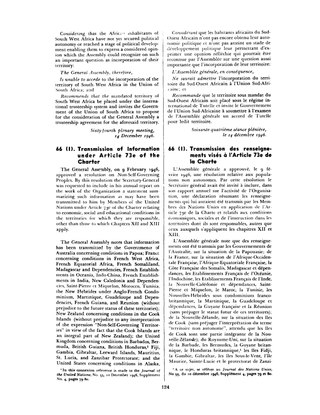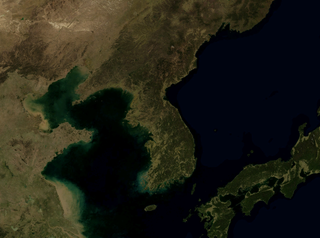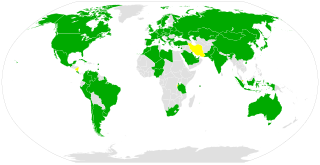| UN General Assembly Resolution 37/37 | |
|---|---|
| Date | 29 November 1982 |
| Meeting no. | A/37/PV.82 |
| Code | A/RES/37/37 (Document) |
| Subject | The situation in Afghanistan and its implications for international peace and security |
Voting summary |
|
| Result | Adopted |
United Nations General Assembly Resolution 37/37 (1983) stated that the Soviet Union forces should withdraw from Afghanistan. It was the fourth time in three years that the General Assembly had called for Soviet withdrawal from that country.

The United Nations Security Council (UNSC) is one of the six principal organs of the United Nations (UN) and is charged with ensuring international peace and security, recommending the admission of new UN members to the General Assembly, and approving any changes to the UN Charter. Its powers as outlined in the United Nations Charter include establishing peacekeeping operations, enacting international sanctions, and authorizing military action. The UNSC is the only UN body with the authority to issue binding resolutions on member states.

The United Nations General Assembly is one of the six principal organs of the United Nations (UN), serving as its main deliberative, policymaking, and representative organ. Currently in its 78th session, its powers, composition, functions, and procedures are set out in Chapter IV of the United Nations Charter. The UNGA is responsible for the UN budget, appointing the non-permanent members to the Security Council, appointing the UN secretary-general, receiving reports from other parts of the UN system, and making recommendations through resolutions. It also establishes numerous subsidiary organs to advance or assist in its broad mandate. The UNGA is the only UN organ where all member states have equal representation.

The member states of the United Nations comprise 193 sovereign states. The United Nations (UN) is the world's largest intergovernmental organization. All members have equal representation in the UN General Assembly.
A United Nations General Assembly resolution is a decision or declaration voted on by all member states of the United Nations in the General Assembly.
China is one of the charter members of the United Nations and is one of five permanent members of its Security Council.
National question is a term used for a variety of issues related to nationalism. It is seen especially often in socialist thought and doctrine.

The Russian Federation succeeded to the Soviet Union's seat, including its permanent membership on the Security Council in the United Nations after the 1991 dissolution of the Soviet Union, which originally co-founded the UN in 1945. The succession was supported by the USSR's former members and was not objected to by the UN membership; Russia accounted for more than 75% of the Soviet Union's economy, the majority of its population and 75% of its land mass; in addition, the history of the Soviet Union began in Russia with the October Revolution in 1917 in Petrograd. If there was to be a successor to the Soviet seat on the Security Council among the former Soviet republics, these factors made Russia seem a logical choice. Nonetheless, due to the rather inflexible wording of the UN Charter and its lack of provision for succession, the succession's technical legality has been questioned by some international lawyers.

The United Nations Security Council veto power is the power of the five permanent members of the UN Security Council to veto any "substantive" resolution. They also happen to be the nuclear-weapon states (NWS) under the terms of the Treaty on the Non-Proliferation of Nuclear Weapons. However, a permanent member's abstention or absence does not prevent a draft resolution from being adopted. This veto power does not apply to "procedural" votes, as determined by the permanent members themselves. A permanent member can also block the selection of a Secretary-General, although a formal veto is unnecessary since the vote is taken behind closed doors.
United Nations General Assembly (UNGA) resolution 377 A, the "Uniting for Peace" resolution, states that in any cases where the Security Council, because of a lack of unanimity among its five permanent members (P5), fails to act as required to maintain international security and peace, the General Assembly shall consider the matter immediately and may issue appropriate recommendations to UN members for collective measures, including the use of armed force when necessary, in order to maintain or restore international security and peace. It was adopted 3 November 1950, after fourteen days of Assembly discussions, by a vote of 52 to 5, with 2 abstentions. The resolution was designed to provide the UN with an alternative avenue for action when at least one P5 member uses its veto to obstruct the Security Council from carrying out its functions mandated by the UN Charter.

Chapter XI of the United Nations Charter defines a non-self-governing territory (NSGT) as a territory "whose people have not yet attained a full measure of self-government". In practice, an NSGT is a territory deemed by the United Nations General Assembly (UNGA) to be "non-self-governing". Chapter XI of the UN Charter also includes a "Declaration on Non-Self-Governing Territories" that the interests of the occupants of dependent territories are paramount and requires member states of the United Nations in control of such territories to submit annual information reports concerning the development of those territories. Since 1946, the UNGA has maintained a list of non-self governing territories under member states' control. Since its inception, dozens of territories have been removed from the list, typically when they attained independence or internal self-government, while other territories have been added as new administering countries joined the United Nations or the General Assembly reassessed the status of certain territories.

Resolution 82 was adopted by the United Nations Security Council (UNSC) on 25 June 1950. It condemned the "armed attack on the Republic of Korea by forces from North Korea", while calling for "the immediate cessation of hostilities" and for "the authorities in North Korea to withdraw forthwith their armed forces to the 38th parallel". The measure was adopted with 9 voting for, none opposed, and one abstention by the Soviet Union, who was boycotting the UN at the time for its recognition of the Republic of China as China's representative to the organization.

The Convention on Registration of Objects Launched into Outer Space was adopted by the United Nations General Assembly in 1974 and went into force in 1976. As of February 2022, it has been ratified by 72 states.

The first emergency special session of the United Nations General Assembly was convened on 1 November and ended on 10 November 1956 resolving the Suez Crisis by creating the United Nations Emergency Force (UNEF) to provide an international presence between the belligerents in the canal zone. The emergency special session was convened due to the failure of the Security Council to resolve the instability at the Suez Canal, invoking "Uniting for Peace" resolution which transferred the issue from the Security Council to the General Assembly. On the fourth day of the session the Canadian representative, Lester B. Pearson, introduced the concept of a UN police force. The creation of the United Nations Emergency Force was approved by the General Assembly with 57 supports and zero opposes. The vote had 19 countries abstaining, including the United Kingdom, France, Egypt, the Soviet Union and several Eastern European countries.
The sixth emergency special session of the United Nations General Assembly was held between 10 and 14 January 1980 to consider the situation in Afghanistan. As the Soviet–Afghan War began members of the United Nations General Assembly requested the Security Council consider the situation. The USSR veto of a resolution led the other members to invoke the 'Uniting for Peace' resolution to defer the issue to the General Assembly in an emergency special session. It was the sixth emergency special session since the 'Uniting for Peace' resolution was adopted in 1950. The session was dominated by questions of its legitimacy since the Afghanistan government had invited the Soviet intervention in their civil war. Led by the non-aligned members, the session ended with a resolution from the General Assembly calling for the immediate, unconditional and total withdrawal of foreign troops from Afghanistan and the cessation of all outside intervention, subversion, coercion or constraint, of any kind whatsoever, so that its people could freely choose its own economic, political and social systems.

United Nations Security Council resolution 462, adopted on 9 January 1980, after considering an item on the agenda of the council and given the lack of unanimity amongst its permanent members, the council decided to call an emergency meeting of the United Nations General Assembly to discuss the Soviet invasion of Afghanistan.

United Nations General Assembly Resolution 62/243, titled "The Situation in the Occupied Territories of Azerbaijan", is a resolution of the United Nations General Assembly about the situation in Nagorno-Karabakh, which was adopted on March 14, 2008 at the 62nd session of the General Assembly. It became the seventh United Nations document concerning Nagorno-Karabakh and the third and last United Nations General Assembly document on it.
United Nations General Assembly Resolution 65/265 is a resolution of the United Nations General Assembly which suspended the right of Libya to take part in the Human Rights Council. Adopted on March 1, 2011 without vote, the resolution was passed in response to Muammar Gaddafi's treatment of protesters in the 2011 Libyan civil war.

The United Nations General Assembly resolution 498 was approved on February 1, 1951, in response to the intervention of Chinese Communist troops in Korean War.
Ukraine was one of the founding members of the United Nations when it joined in 1945 as the Ukrainian Soviet Socialist Republic; along with the Byelorussian Soviet Socialist Republic, Ukraine signed the United Nations Charter when it was part of the Soviet Union. After the dissolution of the Soviet Union in 1991, the newly independent Ukraine retained its seat.